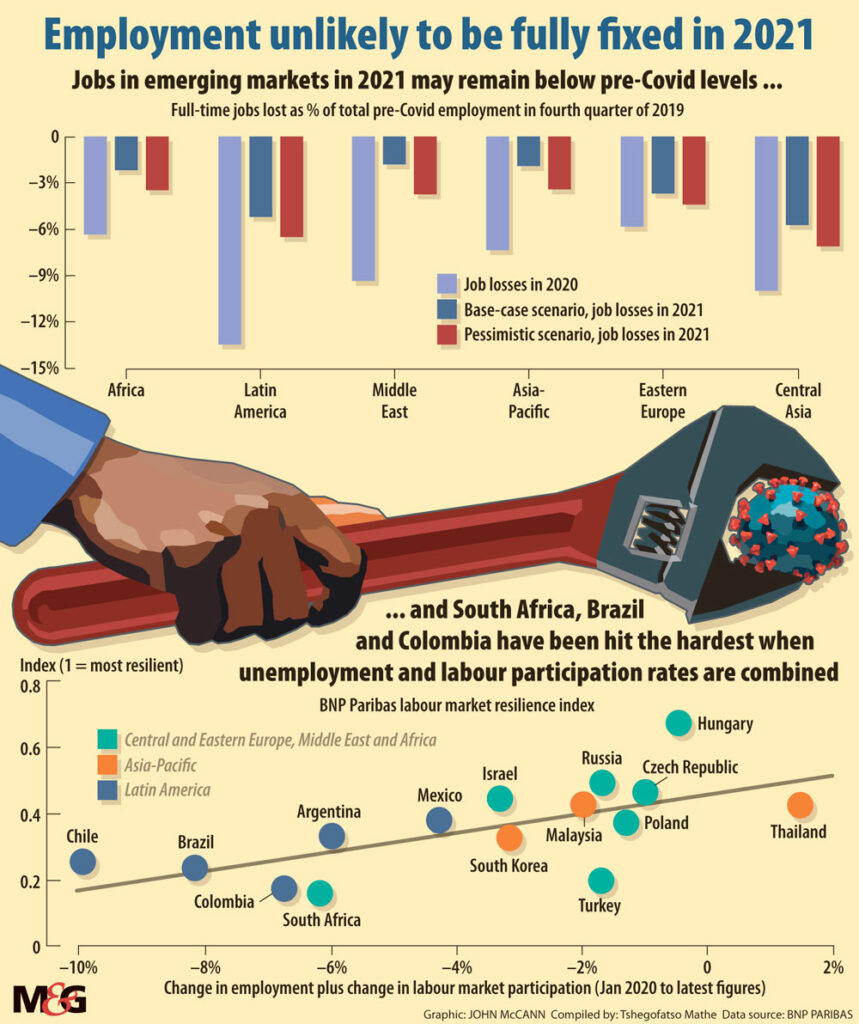(John McCann/M&G)
Covid-19 has disrupted labour markets around the world, resulting in a jobs bloodbath, and recent research shows that women have borne the brunt of unemployment.
Progress for women in the workplace could be back to 2017 levels by the end of 2021 as a result of the pandemic, according to the PwC Women in Work Index 2021, which measures female economic empowerment in 33 organisations for Economic Cooperation and Development (OECD) countries such as the United Kingdom and Greece.
Women who work in lower-paid, contact-intensive sectors have been hit the hardest by the large-scale closure of businesses and sections of the economy. Changes in school and working conditions have also amplified the unequal burden of unpaid care and domestic work carried mostly by women.
The research showed that pre-Covid-19, women spent on average six more hours than men on unpaid child care every week. That has now risen to 7.7 hours.
As a result, between February and May 2020, working mothers in the United Kingdom experienced a 22% fall in paid work hours a day compared to 16% for fathers.
“Caring responsibilities have already caused more women than men to exit the workforce. The longer this higher care burden on women lasts, the more likely
women are to leave the labour market permanently — not only reversing progress towards gender equality but also stunting economic growth,” according to the PwC index.
A similar trend is happening in South Africa. According to Statistics SA’s data for the fourth quarter, the country’s unemployment rate increased by 1.7 percentage points to 32.5%. Within that number, black African women are the most vulnerable with an unemployment rate of 38,5%, coloured women followed at 26%, and white women at 8.1%.
The second set of findings by the National Income Dynamics Coronavirus Rapid Mobile Survey, released in September last year, showed that between April and June, women experienced more job losses than men.
Lullu Krugel, the chief economist for PwC Strategy in South Africa, said the Covid-19 pandemic had disrupted hundreds of thousands of women’s lives, as well as putting a damper on years of progress regarding gender equality.
This is mainly because the economic sectors in which women work have few incentives and protective measures for unemployment.
“Improving female participation in the labour market will have a significant impact on the economy. There are huge benefits from getting more women in productive, well-paid jobs,” said Krugel.
PwC’s research showed that increasing female employment rates in the OECD could boost gross domestic product by $6-trillion.
 (John McCann/M&G)
(John McCann/M&G)
The index also showed that between 2019 and 2020, the annual OECD unemployment rate increased by 1.7 percentage points for women, from 5.7% in 2019 to 7.4% in 2020.
PwC estimates that the index will fall by 2.1 percentage points between 2019 and 2021, taking it below the 2017 score of 62.4%.
But in 2021, the index begins to recover as labour markets rebound.
PwC said it might not be possible to repair this damage fully or “catch up” on the gender equality path that existed before the pandemic.
“Our scenario analysis shows that the OECD needs progress to be twice as fast as its historical rate if it is to completely recover by 2030,” according to the index.
It added that immediate action such as policy responses to support the economic recovery, specifically addressing the pandemic’s effect on women, is required to undo the damage to women’s economic empowerment.
Governments and businesses need to work together to address the underlying gender inequalities exacerbated by the pandemic, the index recommended. They should focus on closing gender pay gaps, supporting female progression and leadership in the workplace and fund employment and business opportunities for women in the economy’s future growth sectors.
Tshegofatso Mathe is an Adamela Trust business reporter at the Mail & Guardian